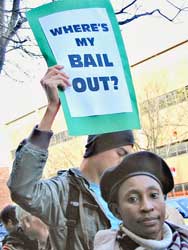CUNY students, teachers resist budget cuts
By
Heather Cottin
New York
Published Dec 7, 2008 6:54 PM
Students and teachers at the City University of New York have been organizing
rallies at their college campuses and at the offices of the CUNY Board of
Trustees, protesting threatened cuts to their education.
|
CUNY/LaGuardia students
at Nov. 24 rally.
WW photo: Heather Cottin
|
Furious over a proposed $600 tuition increase—a result of Gov. David
Paterson’s deep cuts in education, health care and other social services
in New York state—CUNY students will hold three city-wide protests and
rallies against the plan in December.
The announced budget cuts amount to $51 million for CUNY and more than $200
million for the State University of New York system.
CUNY is the biggest city university in the United States. Established for New
York’s working class in 1847, its tuition was free until the 1970s. Then
the Board of Trustees, responding to pressure from militant community
movements, allowed open enrollment. This brought in many students of color for
the first time. But, also for the first time, the students had to pay
tuition.
CUNY is now home to a multinational student body of more than 450,000 in six
community colleges and 11 four-year and graduate schools.
New York has gotten its educated working class on the cheap. Salaries at CUNY
are low. At some of the community college campuses, where the students are
largely people of color, facilities are decrepit.
Some 57 percent of CUNY teachers with doctorates and master degrees are
adjuncts or part-timers. These educators have no job security and few benefits.
They earn less than $25,000 a year.
Last spring, part-timers and graduate students joined in an effort to press
their union, the Professional Staff Congress, to negotiate for job security and
wage equity. The union vowed to work on this. But CUNY employees had been
working without a contract for three years. So when the CUNY Board of Trustees
offered a contract, the Delegate Assembly voted for one that did not include
the contingent teachers’ demands.
CUNY Contingents United (CCU) was formed in late summer to address this
inequity. Made up of graduate student teachers and part-timers, the group began
organizing on various campuses.
The financial meltdown has hit New York, as it has most other states. Four days
after Paterson announced the cut in education funds, CCU and students from
Hunter College and several other campuses held an emergency protest. Some 200
students and faculty came out to oppose the cutbacks and tuition hikes.
In 1975 the big banks that hold city bonds—especially JP Morgan, Chase
and Citibank—threatened to bankrupt the city. Subway fares were raised,
tuition was imposed, programs were cut, and the working class footed the bill
to keep New York afloat.
Now, when Wall Street has been guaranteed more than $7 trillion by the federal
government to continue business as usual, almost half a million of this
city’s students and workers have been asked to shoulder the burden of the
latest meltdown—again with tuition rises, layoffs and fare hikes.
The people are not buying it.
At a meeting at Hunter, students representing many of the CUNY campuses called
for a student strike and expressed solidarity for transit workers whose jobs
are also threatened.
The next week, the PSC organized a protest against tuition increases and budget
cuts that drew about 300 students at LaGuardia Community College. The PSC urged
people to sign postcards to “Save CUNY.” The union will send buses
to Albany, the state capital, to rally against the cuts and tuition hikes.
Members of a new student group, LaGuardia Students United, spoke against the
draconian measures. “We don’t want adjuncts cut,” said Jason
Chester, a LaSU officer. “Some of my best teachers are
adjuncts.”
Another student said: “The MTA is threatening a fare hike, so my commute
will be $100 a month. It’s impossible. I have taken on extra hours at
work to pay for my tuition now.”
“They have hundreds of billions for the bankers, not the people!”
said another. An international student said she is already paying twice what
New York residents pay and can’t afford to double that.
“I have to work two jobs now for my tuition,” said Mayra Gonzales,
a LaSU officer. “I don’t always have enough money for
food.”
The students clearly see the connection between the enormous military budget
and the state’s miserly attitude toward education. “No to wars and
occupation, we want schools and education,” has been a recurring chant at
all the protests.
The CCU vows to “unite with the organized workers’ movement and all
working people, immigrants and minorities who together make up the vast
majority in this city.”
CUNY cuts are already causing class cancellations and layoffs. Militant CUNY
students and workers are organizing for a protracted struggle against the state
and the rich capitalists, like New York Mayor Michael Bloomberg, who command
it.
On Dec. 16, when the next cuts will be announced, CCU will hold a mass rally at
4:30 p.m. at the governor’s office on Third Avenue at 41st Street.
Articles copyright 1995-2012 Workers World.
Verbatim copying and distribution of this entire article is permitted in any medium without royalty provided this notice is preserved.
Workers World, 55 W. 17 St., NY, NY 10011
Email:
[email protected]
Subscribe
[email protected]
Support independent news
DONATE


